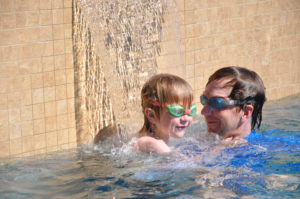
I highly recommended the child development book, Untangled – Guiding Teenage Girls Through The Seven Transitions Into Adulthood, by Lisa Damour, Ph.d
Although it’s a book primarily targeted to parents of teenage girls – it’s reach and application is much broader than that. Parents of girls, boys and all those who fall between or beyond the binary will find it a helpful resource. For parents who don’t yet have a tween or teen, this book is still an excellent read to prepare you for the child development stages ahead. It also helps us realize the importance of early intervention – helping young children with their emotional issues before they enter adolescence, as the period of adolescence adds many more layers of complexity.
When the author and clinical psychologist, Lisa Damour explains the first child development transitional stage: Parting from Childhood she uses an excellent metaphor. She asks us to think of a swimmer in a swimming pool.
Your child is the swimmer, we are the pool and the water is your child’s life-experiences.
“Like any good swimmer, they want to be out playing, diving, or splashing around in the water. And, like any good swimmer, they hold on to the edge of the pool to catch their breath after a rough lap or getting dunked too many times.” (p. 21, Untangled, Lisa Damour)
If you think about a swimming pool, it has very strong walls. As parents, we need to be our child’s rock. We have to be strong and there for them, we can’t crumble. Even when the water is wavy, we need to be able to contain the water and provide a safe place, the edge of the swimming pool, for our children to hang onto. When our children feel secure and safe, they will push off from us (the swimming pool wall) and play and dive and jump into the water.
When our children are young…infants and toddlers, they are completely dependent on us, in and out of a swimming pool. In fact, they need us in the pool with them and it takes a lot of trust on their part to go into the deep end, while holding onto their parent. As they get older, they gain more skills and more confidence to be a little more independent. However, just like the first time they jump into a pool and swim really fast to the edge of the pool to feel safe, they need to do that with us in real life. When they first do something that takes courage, they then come rushing back to us to feel safe.
As our children enter adolescence, it is part of their child development to start to separate from us. Believe it or not, that first eye-roll is instinctual, not taught. Suddenly, your child has a new awareness that his/her views are not always the same as yours. Suddenly, your jokes now seem corny or embarrassing, not funny, and your child is realizing that they need to develop their own identity.
To continue with the swimming pool metaphor, your tween/teen may suddenly need you emotionally and share openly, or need a hug or some advice. You may feel excited that your child is close to you again, but then the next moment, they regroup and push off again.
Unfortunately, the push off may take the form of a mean comment, a petty fight or another hurtful interaction. It’s important, as parents, that we understand what is happening developmentally so that we don’t take it too personally. It’s not okay for your child to be disrespectful to you and they do need you to be a strong swimming pool and remind them of the boundaries – that they have a right to a different opinion than you but they can’t treat you disrespectfully. They do need parents to be strong and able to withstand the push-offs but they also need their parents to be there for them for security when times get tough.
In Untangled, Lisa Damour, includes a “When to worry…” section at the end of each chapter. For this stage of parting from childhood, she reminds us that there’s reason to worry if your child is always compliant and is not showing any signs of trying to grow up and be independent or conversely is always trying to be an adult. If you don’t feel this push-pull of not needing you and then needing you and then not needing you again, this would be unusual during this stage of child development.
When we understand what to expect, it prepares us so that we can respond versus react.
I hope the image of your child in a swimming pool helps you understand this particular stage of child development, and your purpose as the swimming pool.
Warmly,

PS. If you found this information useful, please share with your friends and family.
Here’s a related article about the stages of psycho-social development from birth-adult.
If you purchase the book, Untangled through any Amazon links on this page, you will not be charged more but I will receive a very small commission which goes toward the running of this website. Thank you, in advance, for your support.
To receive my free ebook, 8 Common Mistakes to Avoid When Your Child Is Anxious, and receive free weekly parenting tips from me, click here.
Want to Connect?
Subscribe now to receive free weekly parenting tips and inspiration.






